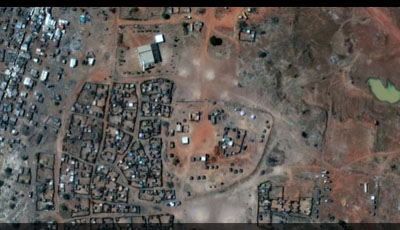
With my iPad, I can peer each morning at the latest high-resolution imagery of Sudan, captured by DigitalGlobe's constellation of satellites, from 450-700 kilometers (280-435 miles) above Earth, hurtling at 17,000 MPH ground speed. You can see some of these amazing images, too, in the Satellite Sentinel Project's first report, released yesterday.
The crux of our undertaking, with a mission to deter a return to full-scale war and promote greater accountability, hinges on the ability of commercial satellites to capture and present evidence of troop movement and potential threats to civilians in the region.
In embarking on an endeavor of such significance to human rights and human security, we need to utilize the highest quality geospatial data and ensure clear and accurate imagery collection. This is why we have collaborated with DigitalGlobe, the global satellite imagery leader that owns and operates the most agile and sophisticated constellation of high-resolution commercial earth imaging satellites available—QuickBird, WorldView-1, and WorldView-2.
These satellites are able to monitor activity and analyze potential security threats using high resolution imagery and with unparalleled collection capacity. In the last 30 days, these satellites have imaged nearly 750,000 square kilometers of Sudan.
Of course, any data needs to be corroborated with policy analysis, field reports and crisis mapping. But it is our hope that the targeted, near real-time verification offered by this advanced satellite technology will help to deter atrocities, activate a response, and ensure accountability.
Our hope is founded on the premise that better, faster images of emerging crises make for stronger, faster responses. Will it work? Let's find out.
Today marks Holocaust Remembrance Day, as well as the release of our first report. Therefore, on this solemn occasion of remembrance and rededication to the vow, "Never again," it is good to have reason for hope. Let us hope the power of satellite imagery and analysis — the keen, clear eyes that spot emerging crises and alert the world — can help hasten the promise of peace.

